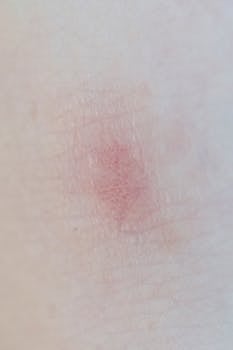
More Allergy, Asthma & Infectious Disease Articles
What You Need to Know About Managing MCAS Rash Symptoms

Understanding how to manage symptoms like an MCAS (Mast Cell Activation Syndrome) rash can be essential for individuals affected by this condition. An MCAS rash can be particularly challenging, as the symptoms often vary between individuals. Typically, these rashes present as hives or flushing, which can cause significant discomfort and distress. Learning effective strategies for managing these symptoms is important for improving your quality of life.
Understanding MCAS Rash
A rash caused by MCAS can manifest due to the body’s response to a range of triggers. These triggers can include food, stress, temperature changes, or allergens. When mast cells become overly activated, they release a host of chemicals, including histamine, leading to symptoms such as itching, flushing, and hives.
The severity and appearance of an MCAS rash can vary. Some people may experience mild redness and tingling, while others could have more pronounced hives. It is always best to consult a healthcare professional to determine the source of the rash and create a personalized management plan.
Identifying Triggers and Managing Symptoms
Identifying and avoiding triggers are crucial steps in managing an MCAS rash. Keeping a detailed diary of food intake, stress levels, and environmental exposures can help pinpoint what may be causing a flare-up in symptoms. Dietary changes and environmental modifications might be recommended by healthcare providers to help reduce occurrences of rashes.
Antihistamines are often considered a first line of defense against the symptoms of an MCAS rash. They work by neutralizing the effects of histamine that mast cells release. However, their use should be discussed with a healthcare provider to ensure they are appropriate for your situation.
Learn more about integrative approaches to managing MCAS rash and other symptoms.
Lifestyle Adjustments for Managing MCAS Rash
Incorporating lifestyle adjustments can greatly support the management of MCAS rash symptoms. Regularly practicing stress-reducing techniques, such as yoga or meditation, can be beneficial. Stress is a known trigger for MCAS symptoms, and managing stress levels should be a priority.
Additionally, using skin-soothing products that are free from irritants can help alleviate discomfort associated with rashes. Gentle, fragrance-free moisturizers or oatmeal baths can provide relief from itchy skin.
Medical Treatments and Support Options
For some individuals, medical intervention is necessary to manage MCAS rash symptoms effectively. A healthcare professional may prescribe stronger medications, such as corticosteroids, to reduce inflammation and symptom severity. In severe cases, personalized immunotherapy may be explored.
Joining support groups can provide emotional relief and practical advice from others experiencing similar challenges. These groups can be found online or through healthcare providers, offering a space to share experiences and coping strategies.
Conclusion
Effective management of an MCAS rash requires understanding individual triggers and exploring a variety of treatment options. By combining medical advice with lifestyle modifications, individuals can better control their symptoms and improve their overall well-being. Consult with a healthcare professional for tailored advice and support as you navigate managing MCAS rash symptoms. For more comprehensive information on health-related topics, visit this Health page on Wikipedia.
- MCAS rashes often involve hives or flushing caused by activated mast cells.
- Identifying and avoiding specific triggers helps prevent symptom flare-ups.
- Medications like antihistamines can provide relief from rash symptoms.
- Lifestyle adjustments, such as stress management and skin care, can be beneficial.
- Consultations with healthcare professionals are crucial for personalizing treatment plans.
What is an MCAS rash?
An MCAS rash is a skin reaction caused by excessive activation of mast cells, leading to symptoms like hives and flushing. These rashes occur due to triggers such as food, stress, and environmental factors.
How can I identify my MCAS rash triggers?
Maintaining a detailed diary of your daily activities, diet, and environmental exposures can help in identifying potential triggers. Discuss your findings with a healthcare provider for professional advice.
Are antihistamines effective for MCAS rash?
Yes, antihistamines are commonly used to manage MCAS rash symptoms as they counteract the effects of histamine released by mast cells. However, their use should be guided by a healthcare provider.
Can lifestyle changes help manage MCAS rash?
Absolutely! Incorporating stress-reducing techniques, avoiding known triggers, and using gentle skincare products can support the management of an MCAS rash and improve your quality of life.
Should I consult a doctor for MCAS rash?
Yes, consulting a healthcare professional is advisable for personalized guidance and to explore appropriate treatment plans. They can offer tailored advice based on your specific symptoms and needs.
Other Articles You May Find of Interest...
- Mastering ANC Calculation: A Complete Guide to Understanding Absolute Neutrophil Count
- Is Quantiferon TB Gold Plus the Key to Accurate Tuberculosis Screening?
- Mottled Skin: Causes, Symptoms, and Treatment Options Explained
- Understanding Petechie: Causes, Symptoms, and Treatment Options for Better Health
- What Does an Orange Tongue Indicate About Your Health?
- Maximizing Lung Health: The Importance of Minute Ventilation Explained
- Navigating the Challenges of Nightshade Allergy and Its Impact on Health














